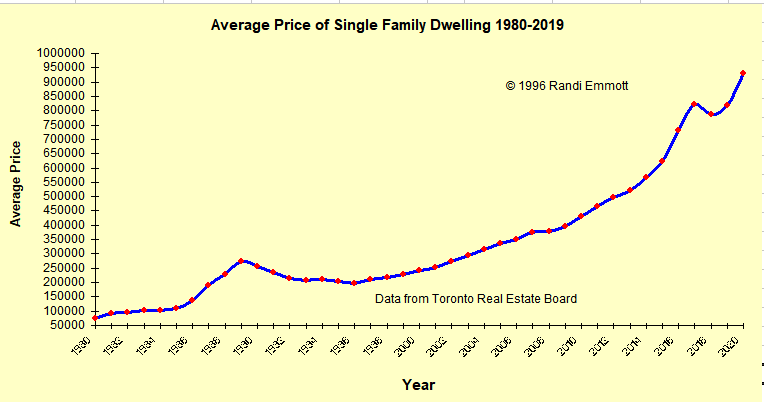A gradual slow down is a good thing instead of a crash which the U.S. has experienced.
The US had a gradual slowdown before the crash, too. But I'm not saying we're going to have a financial meltdown. I do, however, think we're going to have a housing crash. The amount of money that's been going into housing, which are depreciating assets (despite their speculative price rises) coupled with record-high consumer debt is demanding a correction.
Where do people think they extra money in the economy is coming from to keep pushing house prices up and up? Answer: cheap money being printed due to the Bank of Canada's loose money policy. This is encouraging people to take on more and more debt. The fact that we had record housing starts in Canada at the height of a recession last year, should have been an indication to any reasonably minded person that all this cheap credit was troublesome.
Houses only go up so much in value because the next person is willing to pay more. But that's not real wealth, anymore than your Apple or Google stock. Your house doesn't pay you. It's an investment you make with the assumption that you'll trade up on it. And then, most people don't realize that massive rises in house prices contribute to general price inflation throughout the whole market, which actually is a negative externality we all face as a result of the price speculation.
Let's create a simple thought experiment to show people why the continuous rise in housing prices in the past thirty years has not been a good thing:
Say you have an economy of 10 people. And 4 homeowners.
Jim has a $175,000 mortgage. He bought his house for $200,000.
Sally has a $$300,000 mortgage. She bought her house for $350,000
Don has a $200,000 mortgage. He bought his house for $230,000
Ryan has a $180,000 mortgage. He bought his house for $210,000
Aggregate Debt: $863,000
Then Yuri comes looking for a house. It turns out that Sally was thinking of moving to a larger house that's being built up the road. And interests rates being really cheap, and given the fact he's been pre-approved for a $450,000 mortgage with $75,000 down. But Sami also wants to by the house and really wants to live there because the neighbourhood would be good for his children. He too has been approved for a mortgage of $450,000. They get into a bidding war, and it turns out that Yuri was willing to pay Sally $420,000 for her house.
Yuri takes on $420,000 of debt (with compounding interest. At 2.9% APR he'll pay almost 150% of this in interest over the 25 year term -- about $630,000) . Sally pays of her mortgage, plus the interest on her mortgage and finds she's clear about $40,000! What a profit.
Realtors look at this and say "wow, Jim and Don, if Sally could sell her house for 20% over what she paid for it two years ago, you're houses are worth $240,000 and $276,000 respectively. And this is exactly what they list them for.
The loose money policy from the Bank of Canada has made it really easy for people to qualify for large mortgages, so the cheap money is there.
Sally goes and buys her new house for $600,000 taking out a $450,000 mortgage. And Sami ends up buying a home right next to her for about the same, he managed to get it at a steal at $550,000! (mortgage: $400,000 -- a little more than he bargained for, but he loves the place)
Aggregate Debt: $1.4 million. But everyone is convinced they're all richer because they have "equity". The global balance sheet shows the entirety of the economy is poorer for this speculative buying and borrowing, but nobody seems to care. They go and take out home equity loans!
The bank gives Jim a low interest $40,000 line of credit against his home's "equity" as a result of the "proved market value" of his home based on Sally's sale. He decides to "invest" it by renovating his kitchen.
Eventually, more new people move into the economy and buy up Jim, Don and Ryan's house for about 25% over what they paid, and Jim, Don and Ryan all similarly trade up to bigger, more luxurious houses.
Starting out we have 4 people averaging $215.75k of debt.
Now we have an economy of 8 people averaging: $254,000 of debt.
And this process continues for years and years, and the rate of housing prices and size of mortgages keeps outpacing inflation. Everybody keeps looking at the resale values and assumes they're all getting richer. But failing to realize the rise in prices have nothing to do with the intrinsic value of the home, but rather the willingness of another person to take on even more debt then the last guy.
Canada, like the US, has been aggressively following this unsustainable trend. Worse, the government's act as if this process is the "backbone" of our economy, lowering interest rates to keep housing prices rising, and prevent deflation, etc. But this is trillions and trillions of dollars going into speculative assets. Not investments that create jobs, other than the builders, who'll be out of work as soon as the market manages to overcome the inflationary monetary policy of the government and brings it to it's knees.
Why should a house naturally rise in value? It doesn't produce anything. It just consumers resources. It's a place to live. But it's not an investment. The fact that most people consider your house to be the "biggest investment" you'll ever make speaks to the root of why we're in a housing bubble. And why our economy is ultimately in a lot of trouble. People put up graphs and say, housing prices have been steadily rising for 30 years, so they'll steadily rise for the next 30 years. Which is a logical fallacy, known as analysis by analogy and in statistics and in science we like to say "past performance in no guarantee of future success".
The reason for the precipitous rise over the past 30 years speaks to a the changes in monetary policies by Western governments towards pro-growth economics, which involves encouraging consumers to borrow and mortgage our way to prosperity. Governments turn on the printing presses every time in looks like the process is going to correct itself, and we all breathe a sigh or relief and return to running up more and more debt.
People also make the mistake of assuming that a mortgage is not debt. That a mortgage is an investment. That, house prices will always outpace mortgage interest. But this has only been true for the past thirty or so years. From the early 19th century all the way up to the 1960's, housing prices in the US and Canada tracked inflation. Housing price inflation basically kicked off right at the same time as the gold standard was officially abandoned with Nixon's canning of the Bretton-Woods agreement. Coincidence? I think not. But we're all convinced that rising housing prices over time are like a law of nature, like gravity. But they're not. They don't produce anything.
Take out a loan to build a factory to make widgets, and every widget you sell makes the investment pay for itself. Take out a loan to buy a luxurious house, and the economy is the poorer for it. Why people can't understand this basic principle is beyond me.





